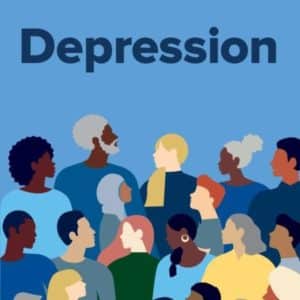Depression is a condition commonly improved with EMDR and/or IASIS Microcurrent Neurofeedback.
A combination of EMDR with IASIS as an add-on commonly promotes improvements in Depression. Moreover, a plan that includes both EMDR and IASIS will promote desensitation and reprocessing, promoting the brain’s engagement in alleviating the symptoms of trauma, and disturbances associated with Depression. Give us a call to discuss your specific needs.
What is depression?
Everyone feels sad or low sometimes, but these feelings usually pass with a little time. Depression (also called a major depressive disorder or clinical depression) is different. It can cause severe symptoms that affect how you feel, think, and handle daily activities, such as sleeping, eating, or working. It is an illness that can affect anyone—regardless of age, race, income, culture, or education. Research suggests that Genetic, biological, environmental, and psychological factors play a role in depression. Depression may occur with other mental disorders and other illnesses, such as diabetes, cancer, heart disease, and chronic pain. Depression can make these conditions worse, and vice versa. Sometimes medications taken for these illnesses cause side effects that contribute to depression symptoms.
What are the different types of depression?
Two common forms of depression are:
- Major depression, which includes symptoms of depression most of the time for at least 2 weeks that typically interfere with one’s ability to work, sleep, study, and eat.
- Persistent depressive disorder (dysthymia), which often includes less severe symptoms of depression that last much longer, typically for at least 2 years.
Other forms of depression include:
- Perinatal depression, which occurs when a woman experiences major depression during pregnancy or after delivery (postpartum depression). For more information, visit www.nimh.nih.gov/perinataldepression.
- Seasonal affective disorder, which comes and goes with the seasons, typically starting in late fall and early winter and going away during spring and summer. For more information, visit www.nimh.nih.gov/SAD.
- Depression with symptoms of psychosis, which is a severe form of depression where a person experiences psychosis symptoms, such as delusions (disturbing, false fixed beliefs) or hallucinations (hearing or seeing things that others do not see or hear). For more information about psychosis, visit www.nimh.nih.gov/psychosis. Individuals diagnosed with bipolar disorder (formerly called manic depression or manic-depressive illness) also experience depression. For more information about this mood disorder, visit www.nimh.nih.gov/bipolardisorder.

Download PDF
Source: National Institute of Mental Health (2021). Depression. Retrieved December 28, 2022, from https://infocenter.nimh.nih.gov/publications/depression
